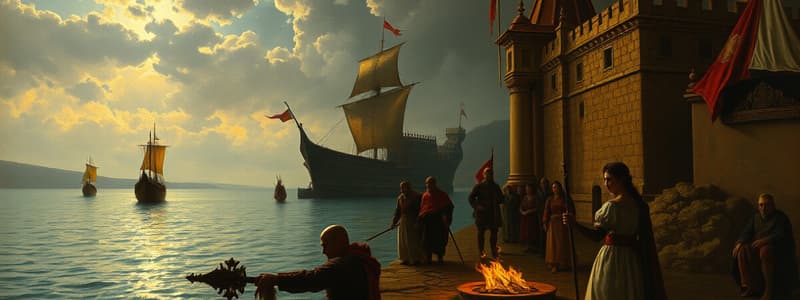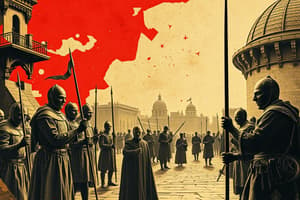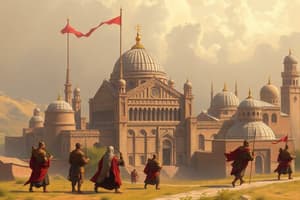Podcast
Questions and Answers
Pope Urban II announced the First Crusade in 1090.
Pope Urban II announced the First Crusade in 1090.
False (B)
The main goal of the First Crusade was to reclaim Jerusalem from the Byzantine Empire.
The main goal of the First Crusade was to reclaim Jerusalem from the Byzantine Empire.
False (B)
Muslims, Jews, and Christians all faced casualties during the First Crusade.
Muslims, Jews, and Christians all faced casualties during the First Crusade.
True (A)
Charles Martel successfully expanded Muslim territories in the west.
Charles Martel successfully expanded Muslim territories in the west.
Some Crusades were aimed at converting non-Christians in northern Europe.
Some Crusades were aimed at converting non-Christians in northern Europe.
The Byzantine Empire did not request aid from the Western powers during the Crusades.
The Byzantine Empire did not request aid from the Western powers during the Crusades.
The First Crusade was primarily motivated by economic gain rather than religious reasons.
The First Crusade was primarily motivated by economic gain rather than religious reasons.
Epic poems played a role in shaping the opinions of newer generations toward Muslims during the era of the Crusades.
Epic poems played a role in shaping the opinions of newer generations toward Muslims during the era of the Crusades.
The Crusades were widely regarded as military successes.
The Crusades were widely regarded as military successes.
Cultural interactions between Europeans and Muslims increased because of the Crusades.
Cultural interactions between Europeans and Muslims increased because of the Crusades.
Italian cities lost power due to the increased trade following the Crusades.
Italian cities lost power due to the increased trade following the Crusades.
The sacking of Constantinople enhanced the split between the Eastern Orthodox Church and the Catholic Church.
The sacking of Constantinople enhanced the split between the Eastern Orthodox Church and the Catholic Church.
Epic poems from the Middle Ages had no influence on the European perception of Muslims.
Epic poems from the Middle Ages had no influence on the European perception of Muslims.
Charles Martel played a crucial role in defeating a Muslim army at Poitiers in 732.
Charles Martel played a crucial role in defeating a Muslim army at Poitiers in 732.
Warriors from western Europe had a clear misunderstanding about the Muslims based on the epic narratives.
Warriors from western Europe had a clear misunderstanding about the Muslims based on the epic narratives.
Pope Urban encouraged warriors to join the Crusade primarily for the pursuit of wealth.
Pope Urban encouraged warriors to join the Crusade primarily for the pursuit of wealth.
The accounts of the First Crusade were mostly dismissed as unreliable by historians.
The accounts of the First Crusade were mostly dismissed as unreliable by historians.
The First Crusade resulted in the humane treatment of the defending Muslim soldiers in Jerusalem.
The First Crusade resulted in the humane treatment of the defending Muslim soldiers in Jerusalem.
The notion of divine mercy was a pivotal theme in Pope Urban's call for the Crusade.
The notion of divine mercy was a pivotal theme in Pope Urban's call for the Crusade.
The clothing of the Franks became adorned with crosses as a sign of their commitment to the Crusade.
The clothing of the Franks became adorned with crosses as a sign of their commitment to the Crusade.
There was no religious motivation behind the decision to join the Crusades.
There was no religious motivation behind the decision to join the Crusades.
The First Crusade was entirely peaceful with no recorded acts of violence.
The First Crusade was entirely peaceful with no recorded acts of violence.
The impact of the Crusades can still be traced in modern cultural and political contexts.
The impact of the Crusades can still be traced in modern cultural and political contexts.
The Franks constructed a bridge from the tower to the wall after the ropes supporting the beams were cut.
The Franks constructed a bridge from the tower to the wall after the ropes supporting the beams were cut.
The defenders of the city remained brave and fought valiantly until the very end.
The defenders of the city remained brave and fought valiantly until the very end.
The wooden beams in the stone wall caught fire due to firebrands hurled by the defenders.
The wooden beams in the stone wall caught fire due to firebrands hurled by the defenders.
An estimated ten thousand people were killed in the temple of Solomon during the fighting.
An estimated ten thousand people were killed in the temple of Solomon during the fighting.
The Christian reconquest in Spain had no significant impact on the region's political direction.
The Christian reconquest in Spain had no significant impact on the region's political direction.
In the Baltic, the Crusades led to the conversion of natives to Latin Christendom.
In the Baltic, the Crusades led to the conversion of natives to Latin Christendom.
Western conquest in Greece had a lasting positive effect on the indigenous population.
Western conquest in Greece had a lasting positive effect on the indigenous population.
The last Latin Christian outposts in the Levantine shore were expelled in 1291.
The last Latin Christian outposts in the Levantine shore were expelled in 1291.
The ports along the Levantine shore were systematically preserved after the expulsion of Latin outposts.
The ports along the Levantine shore were systematically preserved after the expulsion of Latin outposts.
The author suggests that only ruins remain of the Latin presence in Syria and Palestine.
The author suggests that only ruins remain of the Latin presence in Syria and Palestine.
The memories of the Crusades are entirely forgotten in the regions affected.
The memories of the Crusades are entirely forgotten in the regions affected.
The Crusades had no impact on the broader cultural landscape of Europe.
The Crusades had no impact on the broader cultural landscape of Europe.
The Franks' attack on Jerusalem was characterized by a complete absence of resistance from the defenders.
The Franks' attack on Jerusalem was characterized by a complete absence of resistance from the defenders.
The term 'gladiators' in the context refers to trained fighters involved in the conflict.
The term 'gladiators' in the context refers to trained fighters involved in the conflict.
Flashcards are hidden until you start studying
Study Notes
Overview of the First Crusade
- The First Crusade was initiated in response to a call for help from the Byzantine emperor due to the encroachment of Muslim powers.
- Motivations included revenge and hatred, with long-standing battles documented in epic poems influencing public perception.
- Epic poems created preconceived notions about Muslims, depicting them as determined conquerors threatening Christendom.
Byzantine Empire's Role
- The Byzantine Empire, the Eastern Roman Empire, sought assistance from Western powers, specifically calling upon Pope Urban II, who held more authority than kings.
- Crusaders stopped in Constantinople to gather supplies before reaching the Holy Land.
Holy Land Significance
- Jerusalem is a sacred site for Muslims, Jews, and Christians; Pope Urban II prioritized its recapture as it is where Jesus was crucified and buried.
- Islamic expansion had been ongoing, with significant resistance led by figures like Charles Martel, who halted Muslims to the west.
Consequences of the First Crusade
- The First Crusade resulted in significant casualties among Muslims, Jews, and Christians.
- Italian port cities prospered by supplying crusaders, gaining wealth and power.
Pope Urban II's Speech and Motivation
- In 1095, Pope Urban II declared a holy war at the Council of Clermont, promising heavenly rewards for participants.
- He urged warriors to prepare for suffering for Christ, emphasizing divine mercy and forgiveness of sins.
Long-term Impact of the Crusades
- The Crusades, beginning in the eleventh century, aimed to reclaim Jerusalem but later shifted towards wealth and trade route control.
- They led to increased cultural interaction and trade between Europeans and Muslims, significantly influencing Europe's political and cultural landscape and contributing to the Renaissance.
- The sacking of Constantinople deepened the divide between the Eastern Orthodox and Catholic Churches.
Key Events and Outcomes
- The capture of Jerusalem was marked by brutality against defenders, including Christians, highlighting typical military conduct of the era.
- Fulk of Chartres documented the siege, revealing the violent tactics and significant losses during the attack.
Cultural and Political Legacy
- The reconquests in Spain redirected its political and cultural trajectory towards Latin Christendom.
- The Baltic Crusades redefined the area's peoples; however, the effects in Greece were often superficial and brutal for the indigenous population.
- The systematic destruction of Levantine ports by Egyptian sultans eliminated the prospect of a return for Latin Christians after their expulsion in 1291.
Lasting Sentiments
- The memory of the Crusades remains marked by bitterness, particularly among those who experienced the aftermath in regions like Syria and Palestine.
Studying That Suits You
Use AI to generate personalized quizzes and flashcards to suit your learning preferences.




